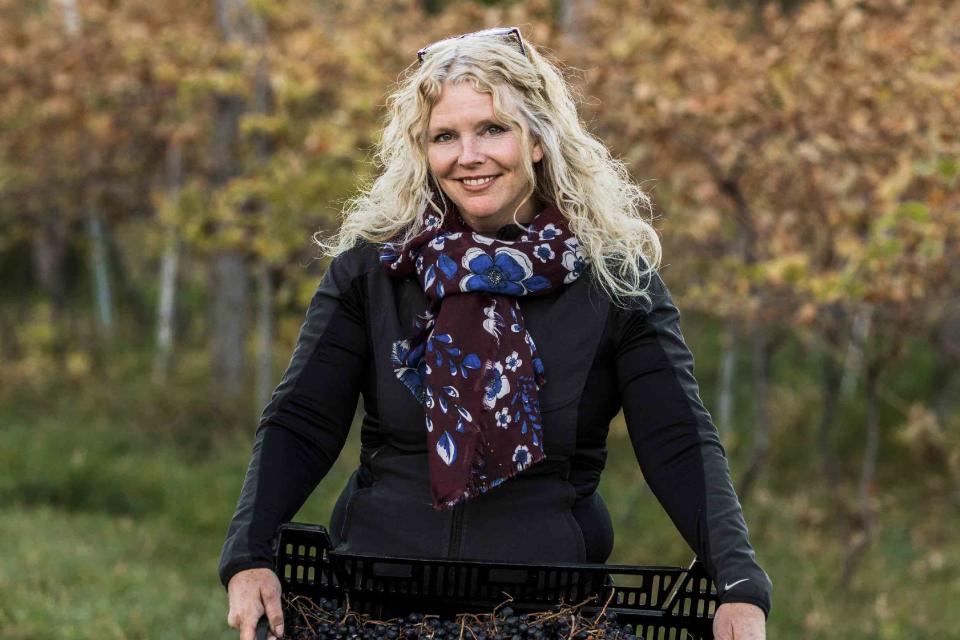Celebrating Hardy Grape Varietals, One Woman Put Vermont on the Map for Winemaking Regions
Deirdre Heekin is recognized as one of the 2023 "Food & Wine" Drinks Innovators of the Year.

Greta Rybus
The history of Vermont wine can be separated into two eras: pre– and post–Deirdre Heekin and her winery, La Garagista.
With frigid winters, short summers, too much mud, and loads of deer ticks, the Green Mountain State is not a likely spot for winemaking stardom. But even before Heekin had bottles for sale, she believed that Vermont’s wine could be worthy, or even great.
To accomplish the task, she celebrated local, cold-hardy grapes like Frontenac, Brianna, and Marquette without apology. She set out to discover Vermont’s identity, avoiding mimicking other famed regions like Bordeaux or Burgundy. People said farming without chemicals — organically or biodynamically or regeneratively — couldn’t be done there. She said to hell with that, it was essential. So was making wine without additives or intervention. In the great tradition of build-it-and-others-will-follow, Heekin plunked Vermont wine down as a contender on the main stage.
See all of Food & Wine Drinks Innovators of the Year 2023
Heekin, who was born in Indiana, met and fell in love with Caleb Barber, a Vermont native, while they were both studying improvisational dance at Middlebury College. It was the late ’80s. The two eventually married and purchased a little cabin with some land on Mount Hunger. Based on their passion for Italy’s food and wine traditions and their desire to work together, they soon opened a restaurant, Osteria Pane e Salute, in nearby Woodstock, managing to plant and grow as much produce as they could for the bistro. Well, she thought, doesn’t a restaurant need beverages?
Noting the local apples, she fermented cider, as well as grapes. In a few years, her bathtub efforts from purchased grapes were so promising that she planted a home vineyard. She released the 2010 vintage commercially (40 cases of half-bottles). In 2017, the couple closed the restaurant and devoted themselves to La Garagista, farming the four acres they had planted up on the mountain and six others down near Lake Champlain.
Heekin, who prunes her vines on snowshoes with no complaints, makes ciders and wines and pioneered the now-popular blurring of boundaries between the two. Today in Vermont, there are about a dozen new micro-wineries, many led by women who studied with her or leaned on her for advice.
“I’ve pinched myself along the way,” Heekin says, looking around at her rustic winery. “I always believed in what the wines could accomplish. Yet I still can’t believe what Vermont has achieved in a very short time. Nor would I have ever imagined my part in this.”
Bottles to Buy
NV La Garagista Lost Causes & Desperate Cases Found Love ($34)
About three years ago, Heekin and her assistant winemaker, Camila Carrillo, started this riveting collaboration based on their mutual fascination with oxidative wines. Lovers of sherry, rejoice! Their first bottled effort is delicious: like a fino sherry, with a Brazil-nut-plus-green-herb character.
2021 La Garagista Grace & Favour ($42)
From Heekin’s Vergennes vineyard comes a La Garagista perennial. This is a pét-nat stunner full of simple joy. Made from the aromatic La Crescent grape, the wine is certainly aromatic; it jumps out of the glass with refreshing flowers and innocence. And at 11.5% alcohol, it’s an ideal thirst-quencher.
For more Food & Wine news, make sure to sign up for our newsletter!
Read the original article on Food & Wine.

